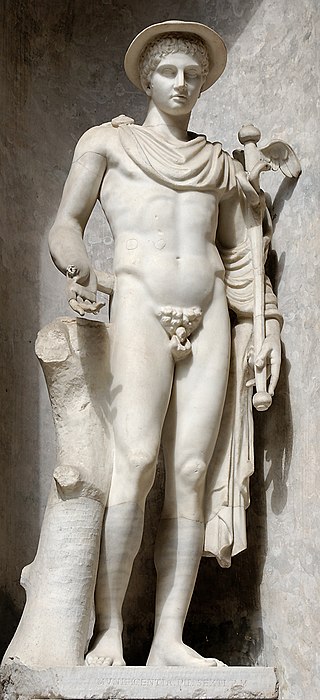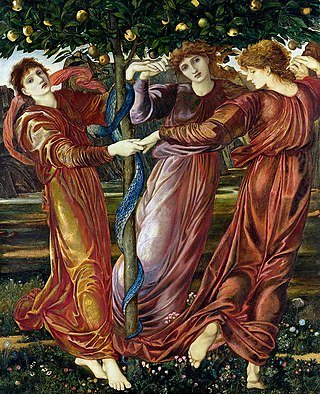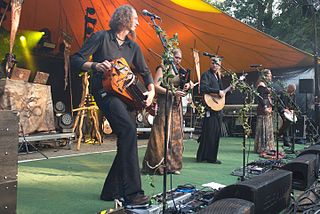
"God Save the King" is the national anthem of the United Kingdom and the royal anthem of each of the British Crown Dependencies, one of two national anthems of New Zealand, and the royal anthem of most Commonwealth realms. The author of the tune is unknown and it may originate in plainchant, but an attribution to the composer John Bull has sometimes been made.

Hermes is an Olympian deity in ancient Greek religion and mythology considered the herald of the gods. He is also considered the protector of human heralds, travelers, thieves, merchants, and orators. He is able to move quickly and freely between the worlds of the mortal and the divine aided by his winged sandals. Hermes plays the role of the psychopomp or "soul guide"—a conductor of souls into the afterlife.

A solar deity or sun deity is a deity who represents the Sun or an aspect thereof. Such deities are usually associated with power and strength. Solar deities and Sun worship can be found throughout most of recorded history in various forms. The Sun is sometimes referred to by its Latin name Sol or by its Greek name Helios. The English word sun derives from Proto-Germanic *sunnǭ.

In classical Greek mythology, Syrinx was an Arcadian nymph and a follower of Artemis, known for her chastity. Being pursued by Pan, she fled into the river Ladon, and at her own request was metamorphosed into a reed from which Pan then made his panpipes.

In ancient Roman religion and myth, Faunus was the rustic god of the forest, plains and fields; when he made cattle fertile, he was called Inuus. He came to be equated in literature with the Greek god Pan, after which Romans depicted him as a horned god.

In Greek mythology, the Hesperides are the nymphs of evening and golden light of sunsets, who were the "Daughters of the Evening" or "Nymphs of the West". They were also called the Atlantides from their reputed father, Atlas.

In ancient Greek religion and mythology, Pan is the god of the wild, shepherds and flocks, rustic music and impromptus, and companion of the nymphs. He has the hindquarters, legs, and horns of a goat, in the same manner as a faun or satyr. With his homeland in rustic Arcadia, he is also recognized as the god of fields, groves, wooded glens, and often affiliated with sex; because of this, Pan is connected to fertility and the season of spring.

The faun is a half-human and half-goat mythological creature appearing in Greek and Roman mythology.

The "Londonderry Air" is an Irish air that originated in County Londonderry, first recorded in the nineteenth century. The tune is played as the victory sporting anthem of Northern Ireland at the Commonwealth Games. The song "Danny Boy" written by English lawyer Fred Weatherly uses the tune, with a set of lyrics written in the early 20th century.

The "Battle Hymn of the Republic", also known as "Mine Eyes Have Seen the Glory" or "Glory, Glory Hallelujah" outside of the United States, is an American patriotic song that was written by abolitionist writer Julia Ward Howe during the American Civil War.

Warrior on the Edge of Time is the fifth studio album by the English rock band Hawkwind. Many of the lyrics are by Michael Moorcock, and the album is loosely based on the concept of Moorcock's novel The Eternal Champion. It was the band's highest-charting studio album on the UK Albums Chart, where it peaked at number 13, and was their third and last album to make the U.S. Billboard chart, where it peaked at number 150. Reviews have been mixed, with Melody Maker panning the album and particularly criticizing the vocal work while the All Music Guide has praised the album for features such as the songwriting. This would also be the last album to feature the band's bassist Ian "Lemmy" Kilmister, who was fired from the band one day before the album's release.
"Take My Hand, Precious Lord" is a gospel song. The lyrics were written by Thomas A. Dorsey, who also adapted the melody.
"Ma'oz Tzur" is a Jewish liturgical poem or piyyut. It is written in Hebrew, and is sung on the holiday of Hanukkah, after lighting the festival lights. The hymn is named for its Hebrew incipit, which means "Strong Rock " and is a name or epithet for God in Judaism. It is thought to have been written sometime in the 13th century, although recent research suggests the 12th century. It was originally sung only at home, but has been used in the synagogue since the 19th century or earlier. In more recent years, of its six stanzas sometimes only the first stanza is sung.

Music was almost universally present in ancient Greek society, from marriages, funerals, and religious ceremonies to theatre, folk music, and the ballad-like reciting of epic poetry. This played an integral role in the lives of ancient Greeks. There are some fragments of actual Greek musical notation, many literary references, depictions on ceramics and relevant archaeological remains, such that some things can be known—or reasonably surmised—about what the music sounded like, the general role of music in society, the economics of music, the importance of a professional caste of musicians, etc.
Pizmonim are traditional Jewish songs and melodies sung with the intention of praising God as well as learning certain aspects of traditional religious teachings. They are sung throughout religious rituals and festivities such as prayers, circumcisions, bar mitzvahs, weddings and other ceremonies.
Eden Burning were a popular Christian band from Cheltenham led by Paul Northup. They originally met as members of Charlton Kings Baptist church, and were active within the Christian music community between 1989 and 1996. The band's name refers to the Biblical tale of Garden of Eden burning down after Adam and Eve are banished. Cross Rhythms magazine described them as "pioneers in the evolution and creative development of British music carrying a spiritual message".

Faun is a German band that was formed in 1998 and plays pagan folk, darkwave, and medieval music. The originality of their music style is that it falls back to "old" instruments, and the singing is always the center of attention. The vocals are performed in a variety of languages, including German, English, Latin, Greek, and Scandinavian languages. Their instruments include Celtic harp, Swedish nyckelharpa, hurdy-gurdy, bagpipes, cittern, flutes, and many others.

Apples appear in many religious traditions, often as a mystical or forbidden fruit. One of the problems identifying apples in religion, mythology and folktales is that as late as the 17th century, the word "apple" was used as a generic term for all (foreign) fruit other than berries, but including nuts. This term may even have extended to plant galls, as they were thought to be of plant origin. For instance, when tomatoes were introduced into Europe, they were called "love apples". In one Old English work, cucumbers are called eorþæppla, just as in French, Dutch, Hebrew, Afrikaans, Persian and Swiss German as well as several other German dialects, the words for potatoes mean "earth-apples". In some languages, oranges are called "golden apples" or "Chinese apples". Datura is called "thorn-apple".
Naer Mataron is a Greek black metal band which draws on imagery from Greek mythology. The band was formed in 1994 after splitting from Nar Mataron, and was soon signed to Black Lotus Records, with whom they released four studio albums. Moving through numerous line-ups, the band has seen influences from other genres of music, including a traditional black metal release and songs featuring elements of melodic black metal and industrial music.

Greek mythology is the body of myths originally told by the ancient Greeks, and a genre of ancient Greek folklore, today absorbed alongside Roman mythology into the broader designation of classical mythology. These stories concern the ancient Greek religion's view of the origin and nature of the world; the lives and activities of deities, heroes, and mythological creatures; and the origins and significance of the ancient Greeks' cult and ritual practices. Modern scholars study the myths to shed light on the religious and political institutions of ancient Greece, and to better understand the nature of myth-making itself.















